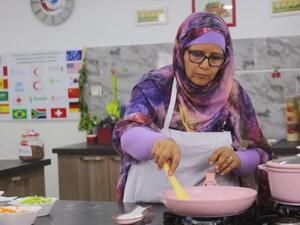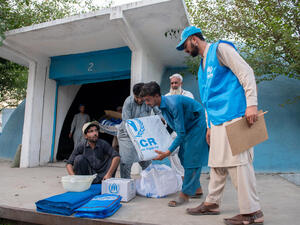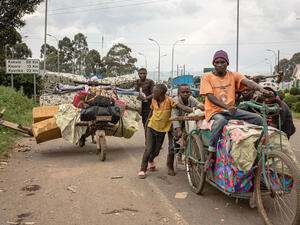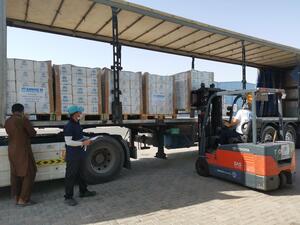UNHCR in major air, land and sea humanitarian aid push into northern Iraq
UNHCR in major air, land and sea humanitarian aid push into northern Iraq

Workers unload trucks laden with hundreds of tents for families displaced by the recent fighting in Iraq. Shelter is a priority for the displaced, many of who are living rough in unfinished buildings, schools, mosques, churches and parks.
ERBIL, Iraq, August 19 (UNHCR) - As it prepares to ramp up its response to the population displacement in northern Iraq, the UN refugee agency is working closely with the authorities in Iraq's Kurdistan region to meet the immense challenges of helping the tens of thousands who have sought shelter there.
Barring delays, the stepped up air, road and sea operation will start with a four-day airlift using Boeing 747s from Aqaba in Jordan to Erbil, followed by road convoys from Turkey and Jordan, and sea and land shipments from Dubai via Iran over the next 10 days. Included in the initial aid shipments are 3,300 tents, 20,000 plastic sheets, 18,500 kitchen sets, and 16,500 jerry cans.
Some 200,000 people have made their way to Iraqi Kurdistan since early August, when the city of Sinjar and neighbouring areas were seized by armed groups. "The number of displaced people flowing [from Syria] into Duhok [province] across the Peshkabour border has slowed in the past week from thousands per day to a few hundred," UNHCR spokesman Adrian Edwards said in Geneva. "All still require our support," he added.
Iraq's current humanitarian challenges are immense. While most of the displaced are still living rough in schools, mosques, churches, unfinished buildings and elsewhere, UNHCR has been pitching hundreds of family tents every day.
Currently, almost a dozen sites are open or about to open in Iraqi Kurdistan's Dohuk and Erbil provinces. These are likely to be boosted by additional camps being set up by the International Humanitarian Partnership - with contributions from Denmark, Estonia, Germany, Norway, Sweden and the United Kingdom.
"At this stage we envisage there being 12-14 sites in all with capacity for 140,000 people," said the UNHCR spokesman, adding that technical staff were currently assessing additional possible camp sites identified by the Kurdistan Regional Government to determine their suitability and to prioritize locations.
The needs are not confined to the Kurdistan region. There are other camps or sites in other provinces where displaced people have gathered, including in Sulaymaniyah, Diyala and Kirkuk. The Iraqi government has also set up three centres for the displaced in Baghdad.
Meanwhile, the stepped up UNHCR aid push due to start on Wednesday is aimed at helping close to 500,000 people who have been forced to flee their homes amid the deteriorating situation in the north.
The major focus is on improving living conditions for the displaced in the region, particularly people without shelter or housing. Conditions remain desperate for those without access to suitable shelter, people struggling to find food and water to feed their families, and those without access to primary medical care.
"Many are still coming to grips with the tragedy they've been through in recent weeks - fleeing homes with nothing, and many trying to cope with the loss of loved ones. Emergency support is an urgent need that we are trying to meet," UNHCR's Edwards said.
Inside Syria, UNHCR continues to help Yazidi people fleeing the Sinjar area across the border. As of Tuesday, there were an estimated 8,000 people at the Newroz camp, about 60 kilometres from the Iraqi border, plus an estimated 3,000 who have moved to Yazidi villages in and around the towns of Malkia, Qahtania, Amuda, Derbassia.
Others who were staying at the Newroz camp last week have returned to Iraq to reunite with their families. UNHCR is continuing to help with providing transport for the refugees to and from the camp and is flying in more aid from its warehouses in Damascus. The first of six flights arrived in Qamishli last night from Damascus, and the mattresses and electric fans are being delivered to the refugees today, to help improve conditions in the heat.
UNHCR has now provided shelter and relief items to more than 210,000 people. It has also provided over 80,000 displaced people with protection monitoring and needs assessments, and nearly 3,500 individuals have been approved for cash assistance, with some already receiving it. Legal assistance will be provided to vulnerable families to ensure they can access their rights as Iraqi citizens, with referrals being made for those with specific assistance needs. Many also fled without documents, and UNHCR is helping them obtain new ones.
An estimated 1.2 million Iraqis have been displaced so far in 2014, including some 600,000 people uprooted by the Anbar province crisis which began in January, and 600,000 displaced from conflicts in and around Mosul and more recently Sinjar, since August.








